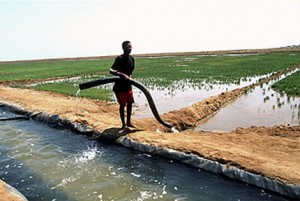In Africa, the primary concern is adapting to the negative impacts of climate change. This means taking both short and long-term approaches to managing climate risks. In the short term, integrating climate adaptation and disaster risk reduction will help withstand shocks to human security and economic development from which recovery can be costly.

African governments, businesses and communities can do much to anticipate and reduce risk, rather than reacting after impacts have occurred. Support for effective disaster relief and recovery needs to continue, along with proactive efforts to reduce risk, such as integrating comprehensive risk assessments and risk reduction measures into national economic and development policy.
In the longer term, governments, businesses and communities need not only to prepare for the kinds of climate impacts experienced up to now but also for different and more intense climate impacts and extreme events. Measures may include providing adequate housing, infrastructure or services, or mainstreaming climate change into urban planning processes.
There are good reasons to start now in the process of adapting to these longer-term risks. The IPCC cautions against overemphasising short-term outcomes or insufficiently anticipating consequences. Given that climate change cuts across sectoral boundaries, poorly conceived development programmes or sector-specific adaptation strategies could lower resilience in other sectors or ecosystems. Some development pathways, like rapid urbanisation of coastal zones, can increase the vulnerability of certain groups to future climate change – known as ‘maladaptation’. This is a particular challenge for Africa where economies are growing rapidly and societies are undergoing significant demographic shifts.
More ‘transformational’ changes may be needed in situations where there are high levels of vulnerability and low capacity to adapt, as is often the case in Africa. Such adaptations entail major economic, social, technological and political decisions and actions, rather than incremental changes to existing structures and processes. They involve, for example, changing agricultural practices, integrating climate change into education, providing useful climate services, diversifying livelihoods or introducing social and technical innovations. Recent success stories from smallholder systems in Africa illustrate the potential for transforming degraded agricultural landscapes into more productive and sustainable systems by integrating trees into annual cropping systems. However, it should be noted that transformational adaptation can result in either positive or negative outcomes, as the greater level of investment and or shift in fundamental values and expectations required for transformational change may create greater resistance.
There is no one-size-fits-all approach to adaptation. The IPCC stresses that no single adaptation strategy will meet the needs of all communities and contexts in Africa. Moreover, the characteristics of a community or society’s capacity to adapt to climate change will differ from place to place, and depend largely on specific contexts. A range of actions that address underlying vulnerabilities, implement specific adaptation measures and instigate transformations may be necessary to reduce climate risks.
There are challenges to adaptation. First, African countries lack climate data and information, which creates difficulties in assessing the overall risks and vulnerabilities triggered by climatic and non-climatic factors. Data and information are vital for countries to develop robust climate-resilient strategies and policies, and national and sectoral development plans. In some cases, adaptation may require additional resources in terms of funding, skills and capacity beyond ‘business as usual’ development.
Second, development planning tends to take place at a national scale and so may not take account of the impacts of climate change and variability in particular localities. National policies can inadvertently disregard or undermine cultural, traditional and context-specific practices that support local adaptation to climate change.
Third, interventions need to cross sectors. The cross-sectoral approach requires institutional integration and collaboration. The practice of working across sectors in Africa, and indeed in many parts of the world, does not come naturally, as it challenges entrenched institutional and sectoral behaviours. Overall, African countries’ adaptive capacity and institutional framework to manage complex social and ecological change, especially at local government level, needs strengthening.
